Last Updated on April 19, 2023
The Sheepadoodle is a crossbreed between the Old English Sheepdog and the Standard Poodle. It’s a medium-to-large-sized dog that measures 16 to 27 inches (41 to 69 cm) tall and weighs around 60 to 85 pounds (27 to 39 kg).
Also known as Sheepapoo or Sheepdog Poodle mix, the Shepadoodle is a calm-tempered, playful, and loving dog that makes them an ideal family pet. They have a friendly nature, and absolutely love cuddles from their owners or children. They are also pretty smart, making them easy to train.
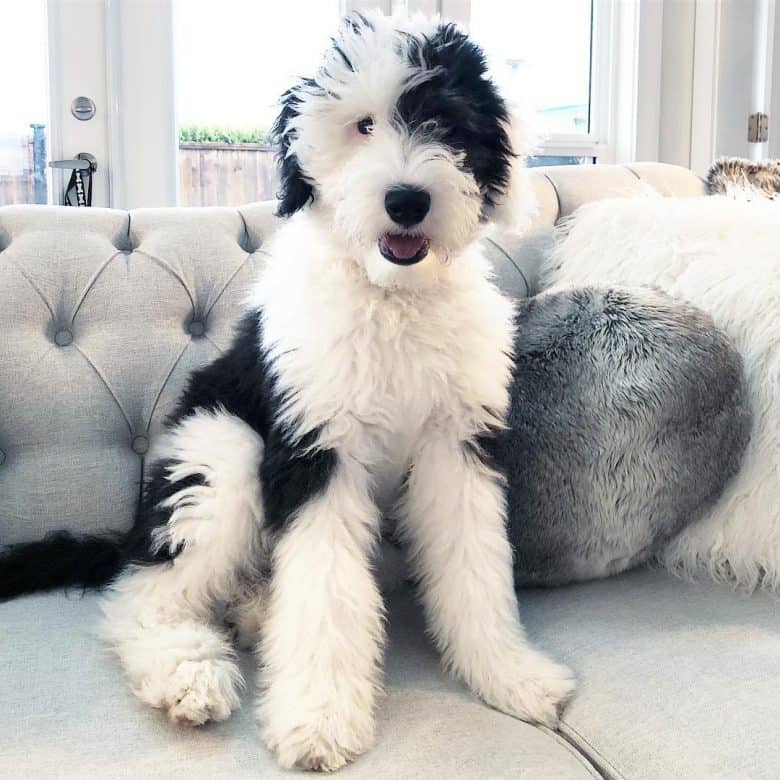
Sheepadoodles are a hypoallergenic dog breed and almost don’t shed. Thanks to their Poodle parent who is known for being very low shedders. However, they do require regular grooming so their fur doesn’t get matted.
If you’re planning to own a Sheepadoodle puppy, keep reading to learn more about this breed’s temperament, characteristics, nutrition and grooming needs and health issues. You’ll be surprised to find out how much personality the Sheepapoo has.
Quick Navigation
The Sheepadoodle at a Glance
We’ve put together a table below to give you a quick overview of the Sheepadoodle.
| Breed Summary | Sheepadoodle Quick Facts |
| Breed Purpose | Companion, Therapy Dog |
| Breed Size | Medium-to-Large |
| Height | 16 to 27 inches (41 to 69 cm) |
| Weight | 60 to 85 lbs (27 to 39 kg) |
| Coat Type | Medium to long, shaggy or curly, single or double layer |
| Shedding | Low |
| Most Popular Coat Colors | Black and white |
| Lifespan | 12 to 15 years |
| Temperament | Friendly, Good-natured, Intelligent |
| Energy | High |
| Exercise Needs | Half to 1 hour per day |
| Average Price | $1,000 to $3,000 |
What is a Sheepadoodle?
Sheepadoodles are a cross between an Old English Sheepdog and a Poodle. Obtaining the best bits of their parent’s traits, this designer dog was an instant success! This breed was born as an experiment in the 60s to be used as a military dog by the US Army. They started appearing in more and more homes, leading this rare hybrid to popularity in 2007.
Since they’re hypoallergenic and almost don’t shed, they’re ideal for allergy sufferers. Their soft and curly coat is usually black and white in color. Some can be all-white or all-black or have their fur turn grey, which is rare. Others have a patch of the opposite color around one or both eyes, making them look like panda bears!
Also called a Sheepapoo, the Sheepadoodle is not purebred, which is why it’s not recognized by the American Kennel Club (AKC). However, it’s recognized by the Dog Registry of America, Inc. and the American Canines Hybrid Club. This crossbreed is registered with the International Designer Canine Registry (IDCR), too.A Look at the Sheepadoodle’s Parentage
The Sheepadoodles’ fantastic set of genes are from their purebred parents, both of which are popular as family pets and working dogs.
Old English Sheepdog
Bred to be herding dogs, these large creatures can herd and nip children. This shouldn’t be an issue with early socialization and training. They’re 80% hypoallergenic and shed less than average dogs. They love the comfort of indoor living and are great watchdogs, but aren’t aggressive enough to be guard dogs.
Known for being playful and for their romping gallop, loyal and adaptable Sheepdogs make them brilliant family pets!
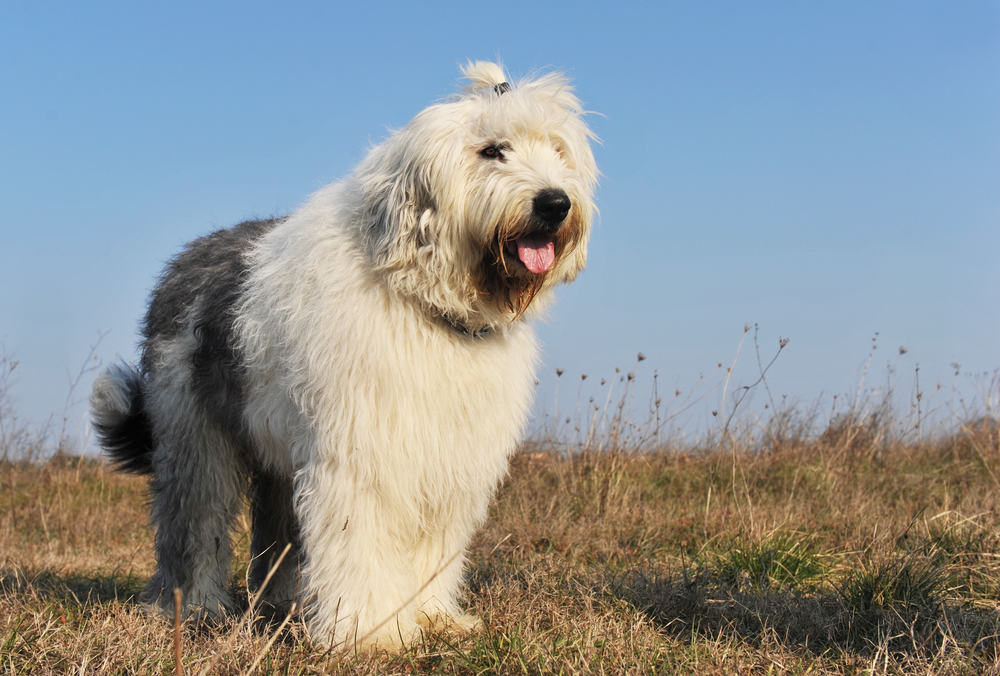
Poodle
Stereotyped as high-strung, Poodles are one of the most intelligent of all dog breeds. They’re also very athletic and agile, and these elegant dogs are amazing water retrievers!

Aside from their hypoallergenic coats, they are famous for their adaptability and sensitivity to human emotions.
How Big Will Sheepadoodles Get?
The Sheepadoodle comes in different sizes, depending on the genes of its parents and the size of the Poodle used in the crossbreeding.
No matter their size, most Sheepadoodles have muscular, well-proportioned, and strong bodies.
Standard Sheepadoodles
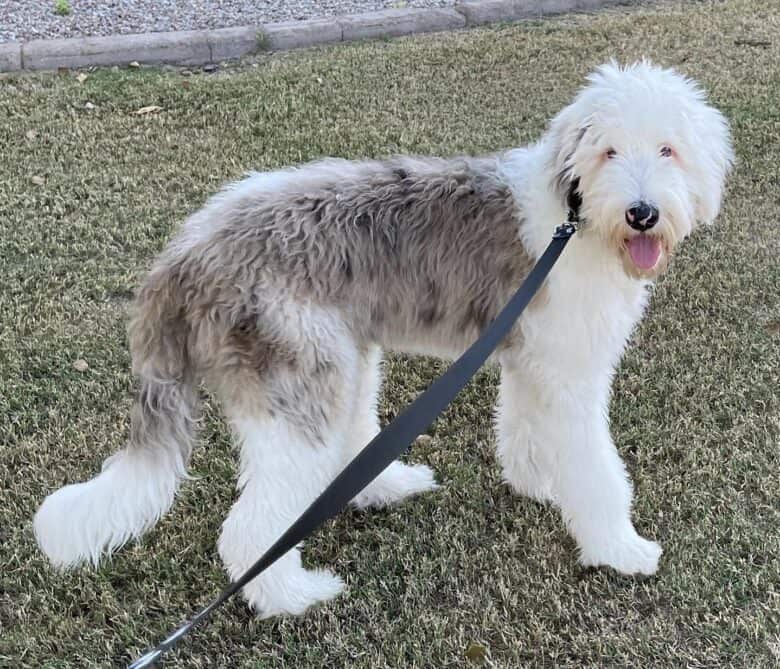
The standard or average-sized Sheepadoodle can weigh between 60 to 85 lbs (27 to 39 kg) and grow to a height of 16 to 27 inches (41 to 69 cm).
As the biggest Sheepadoodle varieties available, these dogs may be more suitable for larger homes.
Mini or Moyen Sheepadoodles
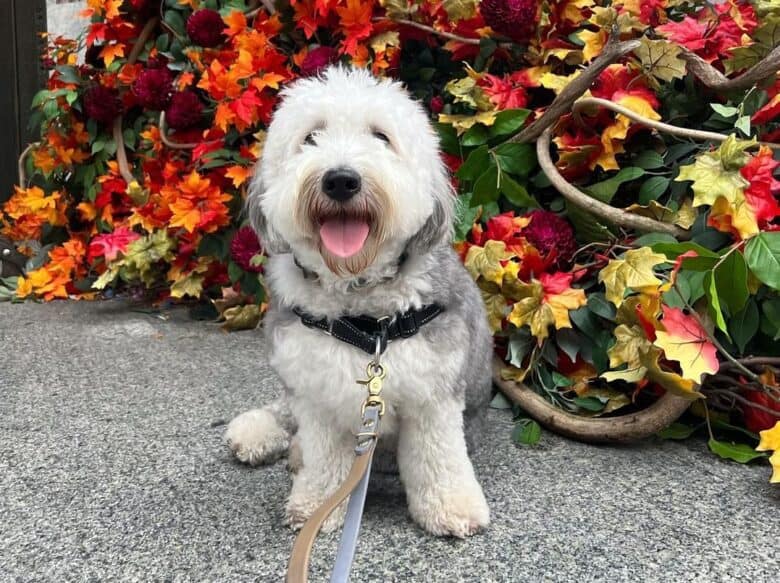
Cross an Old English Sheepdog and a Miniature Poodle, and you get a Mini Sheepadoodle. These dogs have all the things you love about Sheepadoodles in a body that weighs only 35 to 55 lbs (16 kg to 25 kg).
Their growth rate usually stops between 7 to 8 months, at which point they start adding weight to their hips and chest.
Toy Sheepadoodles

You can get this type of Sheepadoodle by crossing a Mini Sheepadoodle with a Toy Poodle. Even though there’s only a handful of the micro-hybrid, which are usually under 35 lbs (16 kg), it doesn’t change their temperament and love of humans.
Feeling worried about all these sizes and wondering if the Sheepadoodle is suitable for your home? With these variations, you can make it work! All you have to do is be ready for some exercise so your furry friend can use all its pent-up energy.
Check out this cute Sheepadoodle puppy:
Are Sheepadoodles Good Pets For You and Your Family?
You’re in luck if you’re looking for a good-natured dog that doesn’t often bark and rarely drools! Sheepadoodles also have big and strong bladders, which makes potty training easy peasy.
But, like with any other breed, essential to explore the Sheepadoodle’s characteristics before buying one.
What are Sheepadoodles really like?
Most owners describe their Sheepadoodle puppies as calm-tempered, playful, and intelligent. They’re loving dogs that make ideal family pets, which means they do not do well when left alone for long periods. They have a friendly nature and love cuddles from their owners or kids.
Just like their Old English Sheepdog parent, there’s a possibility that they would nip at people and herd little ones. You don’t have to worry as you can train and socialize your Sheepadoodle as a puppy and turn it into the most loving dog! Aside from getting along well with anyone, they interact positively with other animals, too.
Their even temperament is their main strength, which they owe to their Old English Sheepdog and Poodle parents. This loyal crossbreed loves to please and is a great companion. And because they’re brilliant and obedient, training is easier, especially if you start early.
How to groom this good-looking fellow Sheepapoo
Sheepadoodles shed little to no fur, which is great for people who suffer from allergies. Some of these dogs have flat and straight hair, while others have beautiful wavy coats.
Keep their hair in tip-top condition by brushing their coat at least 2 to 3 times a week. Get their coats clipped every 8 to 12 weeks to keep it manageable.
Don’t forget to clean and check your Sheepadoodle’s ears, brush their teeth, and keep their nails trimmed! Look for help in making your Sheepadoodle look its best by finding a groomer. Give your dog a bath only when needed – when they’re getting clipped is a great time to do it.
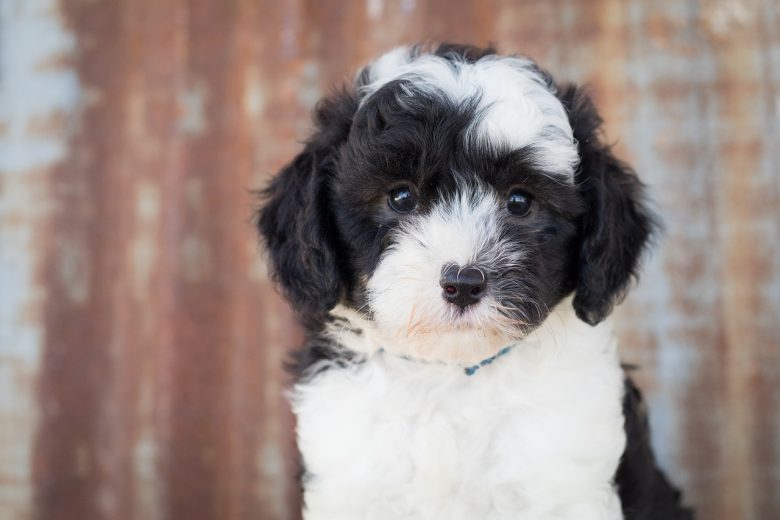
What is the lifespan of a Sheepadoodle?
Thanks to hybrid vigor (which means crossbreds have fewer health issues than their purebred parents), Sheepadoodles are generally healthy. They have an average lifespan of about 12 to 15 years, so they have many years to spend with you and your family.
However, you still have to look out for some health issues that they may inherit.
Most common health problems:
- Hip dysplasia
- Sebaceous adenitis
- Diabetes
- Addison’s disease
- Gastric Dilation-Volvulus
Minor concerns:
- Cataracts
- Glaucoma
- Entropion
- Ectropion
- Deafness
- Red Mange
Just like babies, one of the ways to make sure your pets would grow up healthy is by getting them the vaccines they need. Puppies can be vaccinated between 8 to 10 weeks and should be given a booster after their first vaccine.
Feeding your Sheepadoodle and controlling its munchies

A healthy diet can help with your furry baby’s longevity. The Sheepadoodle’s diet should consist of high-quality kibble that meets your doodle’s age, size, and activity levels.
These hybrids can be prone to digestive issues and tend to become obese. Split your Sheepapoo pup’s feedings into four meals a day to give him a chance to digest his food and avoid over-stretching his tummy.
Once your Sheepadoodle is full-grown, around six months and onwards, you can reduce its diet to 2 to 3 meals throughout the day. Adult Sheepdog-Poodle mixes should be fed 3 cups of top-quality dry dog food daily. Always keep in mind to take it easy on the wet food and that free-flow feedings are a no-no.
The perfect workout buddy that is for keeps

With their herding and hunting genes, it’s no wonder that Sheepadoodles are active. They love to swim, too! They would definitely enjoy trips to the lake, river, or beach. If you have a pool, your Sheepapoo will make the most of it. For walks, one good rule is a 5-minute walk per month of their age.
They’re always eager to learn, and they love challenges, thanks to their smart genes from Poodles. So aside from daily physical exercise, spend time teaching your Doodle new stuff. Play games, give commands, practice some tricks, and they’ll be the most satisfied and thankful pets!
Remember, as with any breed, a consistent rewards-based system, together with verbal praise and treats, is the best training approach.
How Much Do Sheepadoodles Cost?

As they’re becoming popular designer dogs, Sheepadoodles are a coveted breed, which makes them a reasonably expensive choice for a pet. Prices vary depending on the genetic quality of the parents. Don’t worry; pedigrees won’t come into play as AKC doesn’t officially recognize this breed. You have to decide on what size and traits you want.
Generally, a Sheepadoodle can cost between $1,000 to $3,000. If you’re looking for specific traits, you might have to pay more. You can easily find Sheepadoodle breeders online. Here are some breeders you can check out:
- Deb’s Doodles (Northern Virginia, Washington DC)
- Crockett Doodles (South Carolina)
Adopting Sheepadoodle dogs
Have patience because not all shelters have these hybrids, but keep in mind that many abandoned Sheepadoodles need a loving family and a good home.
If you’re keen on getting a full-grown Sheepadoodle, choosing to rescue is a great option. There are a lot of rescue organizations in the US dedicated to Sheepadoodles and Old English Sheepdogs like the following:
- New England Old English Sheepdog Rescue
- Midwest OES Rescue
Always deal with a responsible and legal organization when buying or adopting a Sheepadoodle or any breed. Aside from checking out the Doodle’s health, its parents, and the breeding environment, ensure that the breeder has a certification or license to breed and sell the puppies.
Sheepadoodles vs. other Doodle breeds
Let’s see how the Sheepadoodle stacks up against three of the most popular Poodle mixes today.
Goldendoodles

The crossbreeds of a Golden Retriever and a Poodle, Goldendoodles weigh only 50 to 65 lbs (23 to 30 kg), with a maximum height of 23 inches (58 cm). Their colors can be golden, Irish cream, white, red, or black. These hybrids have a combination of the Golden Retriever’s long, thick hair and the Poodle’s curly hair, so their coats need regular brushing.
Sheepadoodles and Goldendoodles are both sensitive, eager to please, and affectionate family dogs.
Bernedoodles
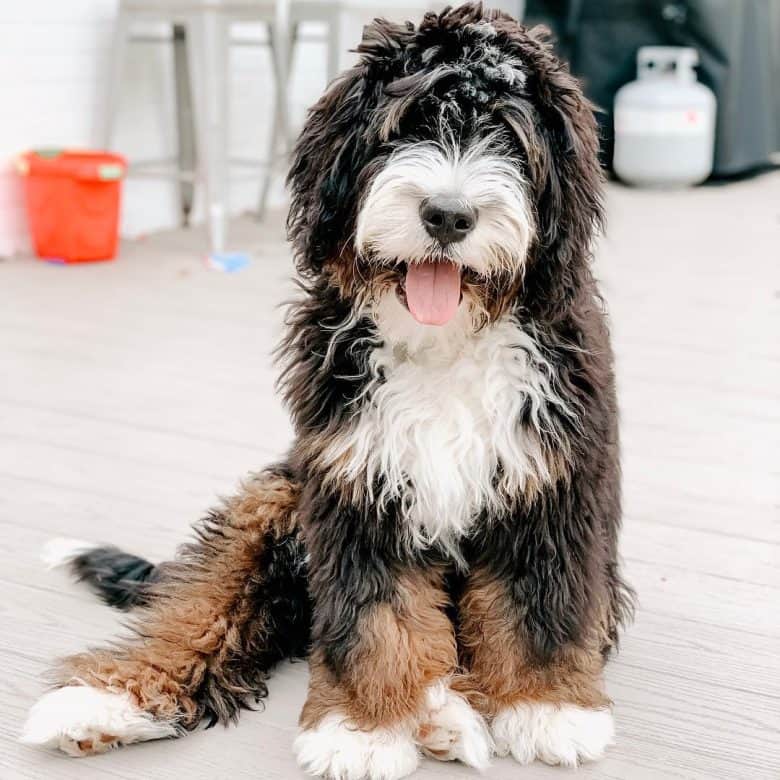
Fans of this mixed breed enjoy the best of the features of the Bernese Mountain Dog and the Poodle. Also known as a Bernese Mountain Poo, the Bernedoodle is loyal, social, and active.
Like the Sheepadoodle, this crossbreed comes in different sizes. The Mini Bernedoodle weighs around 18 to 35 lbs (8 to 16 kg), the Medium version is about 35 to 50 lbs (16 to 23 kg), while the Standard Bernedoodle can go beyond 50 lbs (23 kg and up).
Their colors range from black and white, chocolate and white, red and white, tan and black, to solid black. Their coat is shaggy to curly, which active owners and families would love because it’s more manageable and tends to shed less.
Shepadoodles
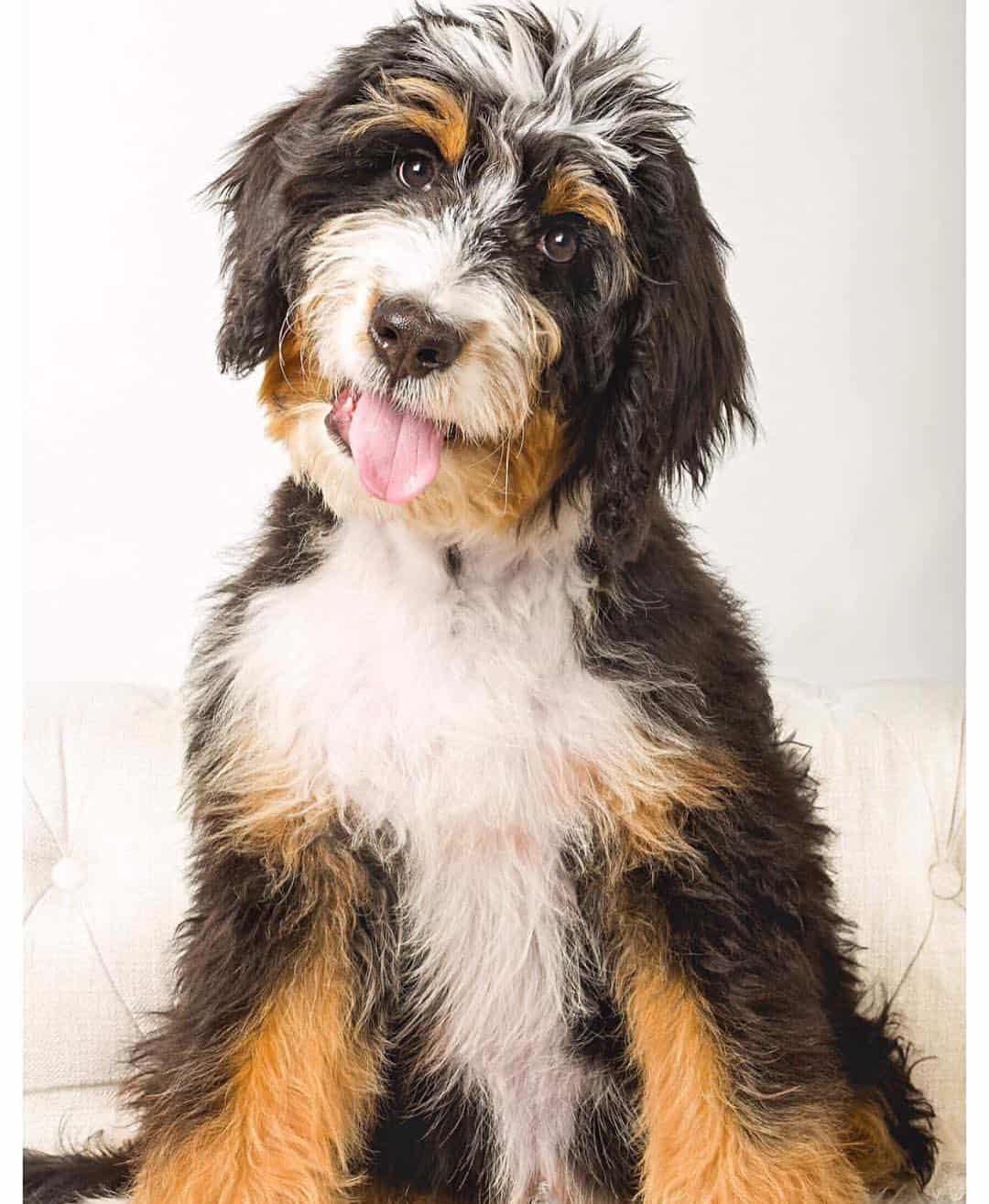
Their names are almost the same, but you shouldn’t confuse Sheepadoodles with Shepadoodles. The latter is a crossbreed you get when combining a standard Poodle and a German Shepherd. They can weigh from 50 to 90 pounds (23 to 41 kg), though some can tip the scales to 125 lbs (57 kg)!
Like other Doodle mixes, the Shepadoodle’s coat needs to be brushed regularly. If not appropriately groomed, these dogs might suffer from fleas.
Why Go For Sheepadoodles?
Though you should be wary of breeders who will talk only about the perfection of the dogs they offer, believe that Sheepadoodles are legitimately excellent family dogs.
If you and your family can dedicate your time to taking care of this crossbreed, you’d get why many people love Sheepadoodles. You won’t regret getting a loyal, affectionate companion that’s intelligent, energetic, and hypoallergenic.
Do you have extra tips for owners who want to get this crossbreed? We’d love to hear about your experiences with the Sheepadoodle, so leave a comment!
Cess is the Head of Content Writing at K9 Web and a passionate dog care expert with over 5 years of experience in the Pet Industry. With a background in animal science, dog training, and behavior consulting, her hands-on experience and extensive knowledge make her a trusted source for dog owners.
When not writing or leading the K9 Web content team, Cess can be found volunteering at local shelters and participating in dog-related events.
